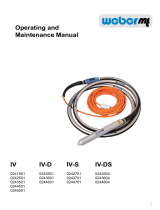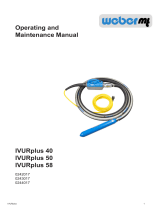
5100013660IVZ.fm 3
1 Foreword ....................................................................................................................5
2 Introduction ...............................................................................................................6
2.1 Means of representation for this operator's manual....................................................... 6
2.2 Wacker Neuson representative...................................................................................... 7
2.3 Described machine types............................................................................................... 7
2.4 Identification of the machine .......................................................................................... 8
3 Safety .........................................................................................................................9
3.1 Policy.............................................................................................................................. 9
3.2 Qualification of the operating personnel....................................................................... 12
3.3 Protection equipment................................................................................................... 13
3.4 Transport...................................................................................................................... 14
3.5 Operational safety........................................................................................................ 14
3.6 Safety when operating hand-held equipment............................................................... 17
3.7 Safety when operating electrical equipment ................................................................ 17
3.8 Safety when operating modular internal vibrators........................................................ 19
3.9 Maintenance................................................................................................................. 20
4 General Power Tool Safety Warnings ...................................................................21
5 Safety and information labels ................................................................................25
6 Standard package ...................................................................................................26
7 Setup and function .................................................................................................27
7.1 Application.................................................................................................................... 27
7.2 Application area ........................................................................................................... 27
7.3 Mode of operation........................................................................................................ 27
8 Components and operator's controls ...................................................................28
8.1 Components and operator's controls of the drive motor.............................................. 28
8.2 Components of the HMS.............................................................................................. 29
8.3 Components of the flexible shaft (optional).................................................................. 30
8.4 Components of the vibrator head (optional)................................................................. 30
9 Transport, entire system (HMS) .............................................................................31
10 Assembly of the HMS .............................................................................................32
10.1 Pre-assemble the vibrator head................................................................................... 32
11 Operation .................................................................................................................34
11.1 Before commissioning.................................................................................................. 34
11.2 Commission ................................................................................................................. 35
11.3 Decommissioning......................................................................................................... 38
Inhalt
























